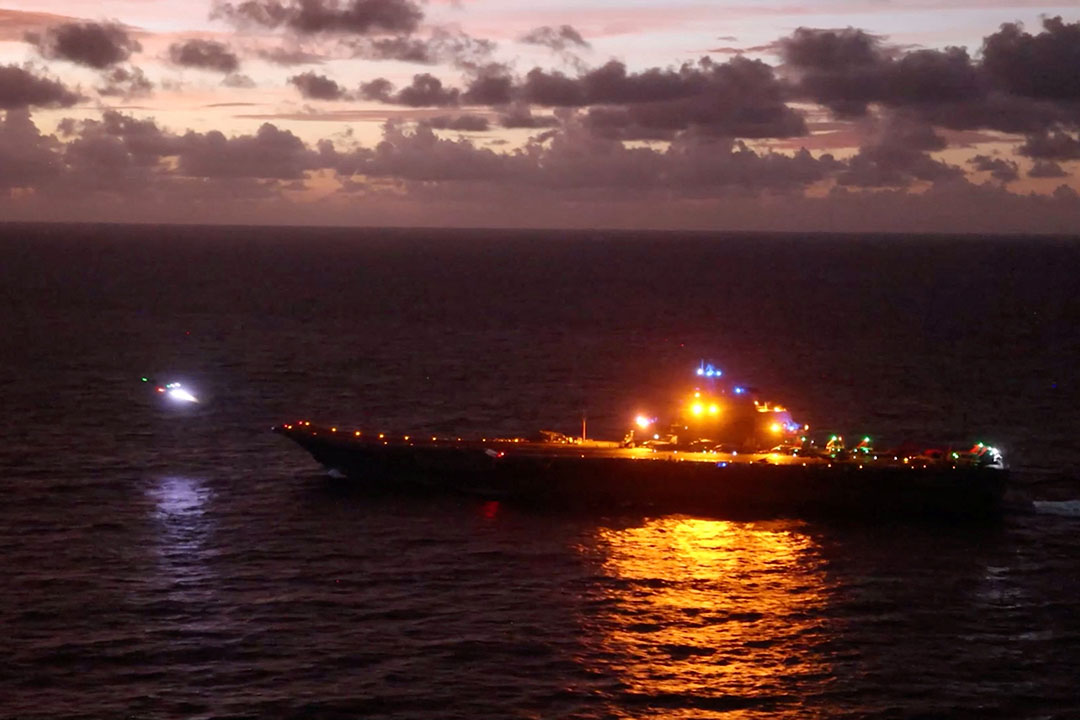
Philippines downplays military chief’s remarks on possible invasion of Taiwan

By Kenneth Christiane L. Basilio, Reporter
THE Philippine military on Wednesday said it was not preparing for war over a potential Chinese invasion of neighboring Taiwan, seeking to dispel concerns about its heightened military readiness.
Armed Forces of the Philippines (AFP) Chief of Staff Romeo S. Brawner, Jr. earlier ordered military forces in northern Philippines to “start planning for actions” in case Taiwan is invaded, a statement that stirred concerns domestically and irked Beijing.
“The guidance was not a response to an imminent threat nor a declaration of heightened alert, but rather a prudent measure to ensure readiness for potential scenarios,” the AFP said in a statement on Wednesday night. “General Brawner’s pronouncement emphasized noncombatant evacuation operation preparedness.”
“The AFP conducts continuous strategic planning to address diverse security scenarios,” it added.
The Chinese Embassy in Manila did not immediately reply to a Viber message seeking comment.
China lays claim over Taiwan, which it views as a breakaway province. It has threatened to annex the self-ruled island, by force if necessary, endangering Taiwan’s population of 23 million and threatening the world’s most advanced semiconductor factories.
The Philippine presidential palace also said the Philippines is not looking to go to war with China.
“We’re not saying when that invasion will take place, whether it will take place at all,” Executive Secretary Lucas P. Bersamin told reporters. “What is important is we will not be caught off-guard. That’s the context of General Brawner’s statement.”
“We are not going to war,” Mr. Bersamin said. “Unless they involve us, of course.”
The Chinese military on Wednesday ended its two-day war games around Taiwan, during which it held maritime blockade drills and long-range, live-fire drills surrounding the island, practice exercises meant at testing the combat readiness of China’s troops, Reuters reported.
Taiwan’s ex-Defense Minister Chiu Kuo-cheng in 2021 said China could be ready to mount a full-scale invasion of the island state by this year, while former US Indo-Pacific Commander John C. Aquilino said all indications point to the possibility of a Taiwan invasion by 2027.
Migrant Workers Secretary Hans Leo J. Cacdac told a news briefing at the palace his agency is ready to ensure the safety of overseas Filipino workers (OFW) in Taiwan.
“The Philippine government stands ready,” he said. “Under the Marcos administration, we have been meeting to assure our overseas Filipino workers and their families of their safety in Taiwan and anywhere in the world,” he added.
In a statement, Manila Economic and Cultural Office Chairperson and Resident Representative Cheloy Velicaria-Garafil said her agency and the Department of Migrant Workers are working with Taiwanese authorities in case of an escalation of conflict between Taipei and Beijing.
“There is no cause for alarm because everyone here in Taiwan is conducting business as usual,” she said. “Filipinos here in Taiwan are used to reports of China’s presence around the territory.”
Security analysts on Wednesday said US Defense Secretary Peter Brian Hegseth’s visit to Manila had likely emboldened the Philippine military to take a stronger stance about the possible invasion of Taiwan.
Concerns that Taiwan’s fall might encourage China to target the Philippines next have likely influenced the Philippine military to take a bolder stance, pushing them to strategically prepare for such a scenario, they added.
“It appears that the Philippines has come to terms with the fact that should anything happen to Taiwan, there will be repercussions on the Philippines,” Julio S. Amador III, chief executive officer at Manila-based geopolitical risk firm Amador Research Services, said in a text message.
“The Philippines and US seem to have decided that they should work more closely not only to respond to threats in the South China Sea but to link on other Chinese aggressions over other areas, like Taiwan,” he added.
AT RISK OF WARMr. Hegseth last week visited Manila, the first leg of his tour in Asia, engaging with Philippine President Ferdinand R. Marcos, Jr. and Defense Secretary Gilberto C. Teodoro, Jr., and agreed to reestablish military deterrence in the region.
An invasion of Taipei would allow Beijing’s military to “focus on other areas China is interested in,” such as the South China Sea or the Benham Rise in the Pacific Ocean, said Justin Keith A. Baquisal, national security analyst at FACTS Asia.
“Taiwan has always been a key security interest for the Philippines because it acts like a strategic buffer for us,” he said in an X message.
“There is merit in the Philippines contributing to military deterrence in Taiwan, because it’s far less costly to deter China now than to allow China to invade,” Mr. Baquisal said.
The Philippine military’s participation in a possible Chinese invasion of Taiwan would likely be limited to evacuating Filipino migrant workers, said Chester B. Cabalza, founding president at Manila-based think tank International Development and Security Cooperation.
“Manila observes the ‘One China Policy’ and the military’s participation in the invasion of Taiwan would only be limited to OFWs’ (overseas Filipino workers) evacuation,” he said in a Facebook Messenger chat.
Evacuating OFWs should not be the sole job of the Philippine military, Mr. Cabalza said, adding that it should be an “inter-governmental effort.”
“Since the whole-of-government approach will be activated in case of forcible retake of Taiwan by Chinese forces, the Office of Civil Defense led by the Secretary of Defense and his counterpart from the Foreign Affairs department should execute the contingency plan for the repatriation of Filipinos in Taiwan,” he said.
The AFP chief’s statement would likely heighten tensions between the Philippines and China, Mr. Baquisal said. “Risks include further diplomatic lashing by China and a broader deterioration of bilateral relations.”
“China will take offense at anything the Philippines and the US does, it is something to be expected,” Mr. Amador said, underscoring the need for Manila and Washington to deepen their security ties.
“The Taiwan question is China’s internal affair and is at the core of China’s core interest,” Chinese Foreign Ministry spokesman Guo Jiakun told a news briefing in Beijing on Wednesday. “We urge certain people in the Philippines to refrain from making provocations and playing with fire on the Taiwan question.”
Meanwhile, a Philippine policy think-tank on Wednesday said that Mr. Brawner’s Taiwan statement puts Filipinos at risk of war.
“The statement implies a willingness to involve the Philippines in a potential armed conflict, which could jeopardize national security and the lives of millions of Filipinos,” Roland G. Simbulan, chairman of the Center for People Empowerment in Governance, said in a separate statement.
He said a military posture statement, such as Mr. Brawner telling northern Philippine military forces to prepare for a Taiwan contingency, requires legislative oversight. “This kind of posture bypasses democratic checks and balances, exposing the country to unnecessary risks.” — with John Victor D. Ordoñez



